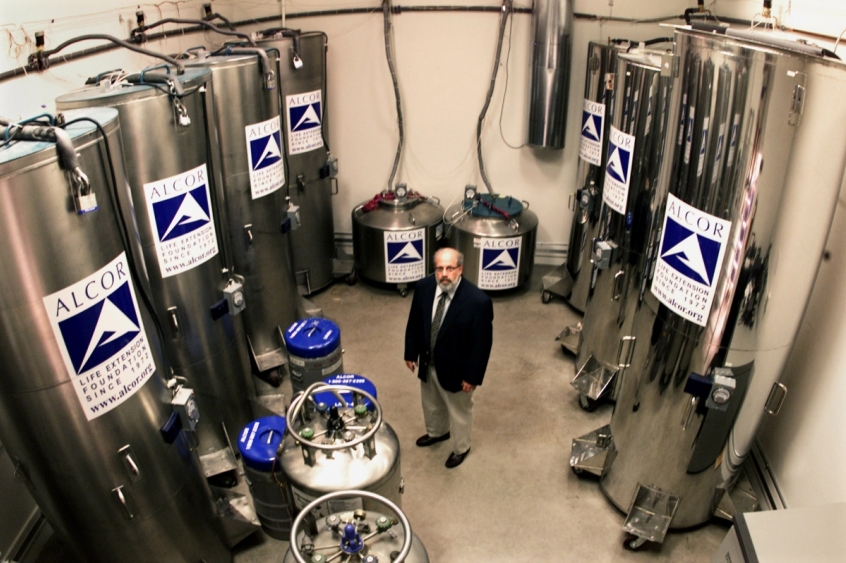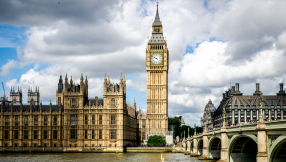The late Christopher Hitchins in his last book made one of the saddest statements I have ever heard: 'I don't have a body, I am a body.'
If that were true then the company in Arizona that believes in cryonics might be worth checking out. It freezes human bodies at minus 320 degrees in the hope that some day in the future they can unfreeze you and bring you back to life. Your head will cost you £42,000, your whole body £80,000.

But maybe we are more than just a body?
Solomon has been reflecting on life 'under the sun'. Last week we looked at the problem of happiness and the burden of eternity. He makes further observations about human society and the death of our bodies. Let's consider these verses from two perspectives.
1. Life and death without God
a. Injustice, verses 16-17. The child cries 'that's not fair'. Adults far too often shrug their shoulder and agrees that 'unfair things happen'. Where you expect to see justice there is injustice. Solomon probably has in mind some injustices he has seen. 'He appointed judges in the land, in each of the fortified cities of Judah. He told them, "Consider carefully what you do, because you are not judging for man but for the Lord, who is with you whenever you give a verdict. Now let the fear of the Lord be upon you. Judge carefully, for with the Lord our God there is no injustice or partiality or bribery"' (2 Chronicles 19: 5-7).
b. Meaninglessness/futility, verses 18-21. If there is no God, we are just like the animals. We die and that is it. We return to dust and dust we remain. There is nothing. We are just 'naked apes'. Think of our society's obsession with the body. You could have the most beautiful body but it will still end up as dust, just as much as the overweight slob whose only exercise is to open the fridge door or take the short walk from the car door into McDonalds.
What is the point? We might as well eat drink and be merry, for tomorrow we will die. I heard of someone who was a keen keep-fit fanatic – hill walking, fruit and veg etc. Aged 38, he stepped out of his front door and died. What is the point of living just for your material possessions or your wealth? Listen to what the Bible says – we brought nothing into this world and we will take nothing out of it.
Others live for their families – as long as we've got our families around us that is all that matters. Really? If they are just dust and just returning to dust, they are of no more lasting significance than the pile of dirt in our garden.
c. Live for today, verse 22. You can read this along the lines of, 'There is no point – we are all going to die anyway. We do not know what will happen so we might as well just get on with our day to day work.'
But God has set eternity in the hearts of men. There must be more. There is more. Go over these verses again, this time from the perspective of God.
2. Life and death with God
a. Justice: the Teacher has an awareness that there will be a day of judgement. For him, like many of the Old Testament writers, this is a day of hope. This is vital. Why are things so unfair? God will sort it all out and bring it to judgment. Why does he not do so now? 'The Lord is not slow in keeping his promise, as some understand slowness. He is patient with you, not wanting anyone to perish, but everyone to come to repentance' (2 Peter 3:9).
b. Meaning/hope: there is a difference between people and animals. The spirit of man goes up – the spirit of animals go into the ground. We had a goldfish called Speedy, due to the speed at which she swam round the goldfish bowl. One day she lived up to her name and swam so fast she landed outside it and died. We threw Speedy in the bin. You do not bury your Gran as though she were a goldfish.
Have you ever stood beside a body of a loved one? It is not them. It is a body. They have gone. The 'them' the thing that is them, the spirit is gone. But where? If you believe we are just like the animals then it has gone forever. It is as though they never existed and you will certainly never see them again. To go down to the earth is a euphemism for 'ceasing to be effective'.
But that is not the case – the spirit of man goes up. 'But it is the spirit in a man, the breath of the Almighty, that gives him understanding' (Job 32:8). The spirit in the Bible is the life of God in man. It is the principle of human thought, moral energy, intelligence, understanding. 'I remembered my songs in the night. My heart mused and my spirit enquired' (Psalm 77:6).
There is something inside you – in fact it is you. It is what you are. Without it you are dead and gone. Without your hand you are still you. Without your spirit there is no you. James 2:26 tells us that 'the body without the spirit is dead'.
But there is spirit (the word is 'breath' signifying that it is the breath of God). You have a spirit. And because of that you are more than just a naked ape. You are more than flesh and blood. You are more than your family, your work, your gifts. Because of that you matter. G K Chesterton wrote: 'All men matter. You matter. I matter. It's the hardest thing in theology to believe.'
c. Live for today and tomorrow: if there is a God who is sovereign – who knows our times; if he has a purpose even in allowing human injustices, then the attitude of the wise should be joy and confidence as we live our lives here on earth, responsibly knowing that there is a judgment to come. We live our lives here in that light – not knowing what is to come, what will happen on earth after we leave. But we know that there is a purpose and meaning. Malcolm Muggeridge said: 'You know, it's a funny thing that when you're very old, as I am, 75 and near to dying, the queerest thing happens. You very often wake up about two or three in the morning and you are half in and half out of your body, a most peculiar situation. You can see your battered old carcass there between the sheets and it's a tossup whether you resume full occupancy and go through another day or make off where you can see, like the lights in the sky as you're driving along, the lights of Augustine's City of God.
'In that sort of limbo, between being in and out of your body, you have the most extraordinary confidence, a sharpened awareness that this earth of ours with all its inadequacies is an extraordinary, beautiful place, that the experience of living in it is a wonderful, unique experience, that relations with other human beings, human love, human procreation, work, all these things are marvelous and wonderful despite all that can be said about the difficulty of our circumstances.'
It also means that we should prepare for what is to come. The Bible does not tell us that we all die and go to heaven. There is a judgment – and in that judgment we get what we want. Those who want eternal life, those who want to be with God will go there. Those who do not will go to hell. The choice we make is in this life, in time. What will you choose? Why not pray simply – Lord I want to live? Don't put your trust in an American cryonics company being able to resurrect your body at some time in the distant future. Instead trust the one who will resurrect and renew both body and soul. Without cost. Choose life!
David Robertson is associate director of Solas CPC in Dundee and minister at St Peter's Free Church. Follow him on Twitter @TheWeeFlea













